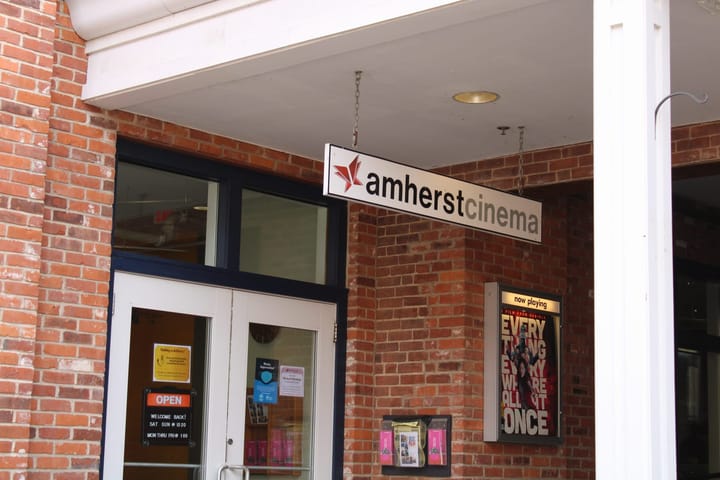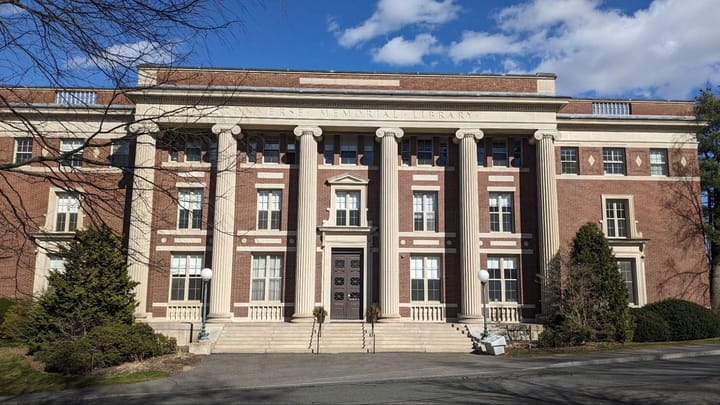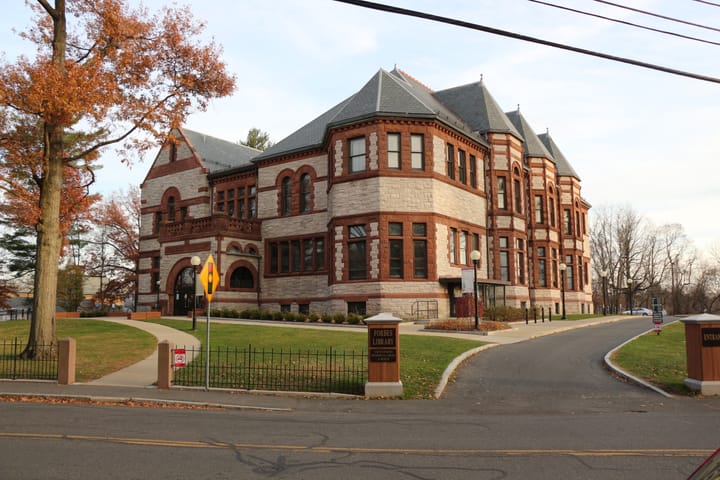CSA Behavior at DASAC Formal Leaves Students Uncomfortable and Upset
On the night of Dec. 7, two CSAs showed up unannounced twice to DASAC’s end-of-semester formal in Lipton Basement. One CSA’s aggressive mannerisms and actions left attendees in extreme discomfort and distress, with the group eventually calling ACPD and reporting the CSA for identity-based harm.
On the night of Tuesday, Dec. 7, two Community Safety Assistants (CSA) showed up unannounced twice to the Dance and Step at Amherst College (DASAC) formal held in Lipton Basement. The party, which followed the college’s party registration rules, had about 20-30 attendees who were all students of color. Students at the event testified that the CSAs’ presence was unnecessarily prolonged, with one CSA repeatedly questioning students and conducting search procedures without explanation. His actions and aggressive mannerisms left attendees feeling “harassed” and in “extreme discomfort,” leading them to call the Amherst College Police Department (ACPD) and report the CSA for identity-based harm.
Three members of DASAC, who will be referred to as Students A, B, and C, spoke to The Student about the incident on condition of anonymity, citing reasons of personal safety and a fear of being targeted again. Student A explained that, prior to the night of the formal, DASAC had reserved the event space for the party from 8 p.m. to 12 a.m. Due to some mismanagement on the part of the administration, however, the party did not make it through the registration process, she said, noting that she was informed of this by Dean of Students Liz Agosto the day after the incident.
Student A posited, “Not that it excuses any of CSA’s behavior, but they did not know that this [party] was in the system. To me that raises more questions, because I don't know how they would have known to come to the space to begin with.” She added that according to Agosto, there were multiple other parties held that night which did not make it through registration due to the mismanagement.
Another member of DASAC, Student B, said that while DASAC was made aware CSAs would be patrolling that night given the high number of formals taking place, they were not informed that the CSAs would visit multiple times, nor what actions they would take once they arrived.
Around 9:30 p.m., the two CSAs entered Lipton Basement. Students in attendance noted that there were less than 10 students in the space at the time, who were merely eating dinner and not consuming alcohol. The CSAs neither introduced themselves nor provided a reason for their presence, said Student B.
One CSA then proceeded to take some of the alcohol in the room that exceeded the college’s 30 percent ethanol limit and dump it in the grass outside. Student A relayed that the group was not aware of the alcohol policy because they had not been notified of which party regulations would be in place before the event, as would have happened if the event had made it through registration. “We were more fine with [the CSA taking the alcohol] because we understood that that was a mistake on our part that we didn't know about,” she said.
The same two CSAs came back to Lipton around 11:30 p.m., again without introductions or addressing their roles as CSAs. Student B reported that students were not playing loud music, engaging in drinking games, or violating any other party rules at the time of the CSAs’ second appearance. Bridget Carmichael ’22E, a member of DASAC who attended the party, reported that one of the CSAs began confiscating her bottles of alcohol, which were in her legal possession since she was over 21. The CSA confiscated her wine, even though it was below the 30 percent ethanol threshold, as well as a bottle of hard liquor.
“I asked the CSAs, ‘Why are you guys being snitches?’ and [one of the CSAs] immediately turned back around and said that was a very derogatory term. I asked him if he was enforcing the rules for all the students or just for the Black students,” said Carmichael. “I asked him how many times he went to [the] football formal tonight, and he said they'd been there three times. That’s not true because their formal was in Northampton — it wasn't even on campus.”
Students reported feeling tense and uncomfortable by this point. “[The CSA] responded in a very aggressive way, almost like, ‘Why are you questioning why I’m here? I'm doing my job,’” Student B said. Student A concurred that it was “an incredibly negative experience, because the group was harassed extremely, [and] the dynamic was that there were two white men in a room full of people of color.”
Having not received a sufficient explanation for the presence of the CSAs, Carmichael continued asking questions. “I told [one of the CSAs], ‘I’m a member of the Community Standards Review Board [CSRB] and the Black Student Union, so I know that Amherst has a history of systemic racism. That’s why I asked you if you visited other white organizations, and you said yes, so you're free to leave,’” she recounted. “Then he was like, ‘You’re saying that I’m racist but I'm not even part of ACPD, I’m acting on behalf of Student Affairs.’ He said that I was the reason the party had to be shut down, that, ‘It's because of you, because you're causing a scene.’”
This CSA then started going through students’ bags, which students alleged he did not legally have the power to do. Student B recounted watching the CSA pull out and confiscate a bottle of hard liquor from her friend’s bag, whom she noted could not consent to the search because she was currently out of the room.
“[The CSA] never asked what belonged to which people. [The alcohol] wasn't out in the open, and it wasn't being served to anyone. It was with other students’ belongings so it was very clear that it was a personal item. That’s when, as a group, we got very upset because we were like, ‘Why are you reaching into anyone's personal belongings? It's beyond your role as a CSA,’” Student B said.
Carmichael recalled the officer also searching through her bag. “He went through my bag which was on my body, and at that point I started to freak out and my dog noticed and started alerting me,” she said. “He told me, ‘Your dog is out of control.’ That dog is my service animal, which is an accessibility technology. I was in a state of panic so my service animal gave me a medical alert. For him to say that is so incredibly ableist and problematic.”
She described feeling “really stung” by the CSA’s lengthy exchange with her. “Every day, I wake up wishing I wasn’t disabled and that I didn’t need a dog in order to survive. For him to call [my dog] an animal that was out of control because the dog was alerting me — [while] he was the one who was putting me into distress — he deserves to be fired.”
Carmichael also recalled the CSA saying to her, “So you think [that because] you are on the CSRB and you're Black that you are above the rules.”
“It was so incredibly racist,” Carmichael said. “He screamed in my face, and — you know what I’ll say it — I screamed right back at him because I am tired of being treated like a doormat. DASAC is like my family, and to see them in such true fear for their safety, it breaks me.”
Student B recounted that even after his exchange with Carmichael ended, the CSA refused to leave. “It seemed like he was on a power trip, because we were all like, ‘Okay, we got it, you've taken our stuff, we no longer even feel comfortable doing anything anymore, just leave,’” she said. “It got to the point where he kind of just wanted to stay to argue with us. And it seemed more like he wanted to make a point than to do anything else.”
Student A described that to get him to leave, students had to work together to encourage him to give up his argument. “We as a group had to push him out, by walking closer and closer, and kept getting more emotionally upset because he just was not leaving. As if this was, again, an argument that he needed to win, as if the situation required that type of behavior.”
Carmichael added that, “Even his counterpart [the other CSA] was like ‘Come on, it’s time to go.’”
Members of DASAC then called ACPD to file a report against the CSA for identity-based harm. Student B said, “We relayed all the information to the ACPD officer. He thanked us for our time, and he seemed pretty receptive overall regarding the entire situation and said that he would look into it. He gave us his email and told us to email him our narrative of the events. And then after that, all of our nights were pretty much over by that point.”
Student B said that most students then ended up leaving the formal. “Once again, it's a group of primarily students of color, and a lot of the Black students were like, ‘I'm not becoming a number today, this is a lot to deal with.’ And understandably so because [the CSAs] kind of just invaded our safe space. At that point, it was already too late to do much about it, so for people's protection and safety, I understand fleeing the scene as soon as they did. It was really unfortunate, because that was a celebration of our first performance after Covid in person. It was supposed to be just a night of release, and it escalated into a lot of things that we weren't expecting.”
Following the event, Student B relayed that various members of the administration reached out to students who were in attendance. As part of the process of filing an identity-based harm report, 10 members of DASAC who attended the party had a two-hour call with Agosto and Title IX Coordinator Laurie Frankl on the following day, Dec. 8.
Student A reported that, according to Agosto and Frankl, as a result of the report, the CSA in question was removed from a student-facing role following the week after the party. However, as of that Wednesday, she noted, “I don't know how long they plan on doing that for, or if I'll be walking on campus next week and see that same CSA doing rounds on campus. I didn’t get that type of assurance from the administration so far.”
Speaking to The Student on behalf of the Identity-Based Harm Review Team, Chief Communications Officer Sandy Genelius said, “The college, including the Identity-Based Harm Review Team, is actively investigating the reports brought forward, and the investigation is not yet complete. When it is concluded, the next steps will be identified.”
In their meeting with Agosto and Frankl, the students emphasized that CSAs don’t make them feel any safer, said Student B. “We talked about how we don't think it's like a safer alternative to ACPD. We also talked about the discrepancy in the way our gathering was treated in comparison to other gatherings that I knew were happening that night. It's so unfortunate, because as a group, when people ask about our formal, it's a very different story than when we're asking our white friends about theirs.”
Student C concurred that the incident highlights some of the issues with policing on campus. “With all the new roles of patrolling happening on campus, like the CDCs [Community Development Coordinators], CSAs, and CSOs [Community Safety Officers], there isn’t a clear description as to what their job is. It seems like they're doing it as a response to restructuring and reimagining the role of the police officers on campus. If you're going to add all these new roles, [you should] have a definite purpose as to why you're adding it and have a definite description as to what they're supposed to do.”
Student A pointed out that another problem with the new CSA role is their lack of direct paths of communication. She recounted how she and her friends were going to call the CSAs to report a loud party in Lipton the following night on Dec. 8, but that due to the fact that there is no direct way to contact CSAs, they instead had to call the ACPD non-emergency line. She said that, unlike the DASAC formal, the party had loud music, open bottles of alcohol, and could not be registered (since parties cannot be registered after the end of classes). Even so, Student A explained, the CSA didn’t shut it down. “I just don't imagine how a CSA that was called repeatedly came to this scene, saw what was happening, and didn't shut it down in the same way that ours was.”
Student A encouraged students to extend their support if they see CSAs similarly abusing their roles. “There have been a lot of issues that have been happening with ResLife [the Office of Residential Life], and Student Affairs, and CSAs. They are treated as one-off incidents when I don't think they are. And I think that there's a trend being formed. The position apparently aims to promote campus safety, but l think it’s doing the exact opposite. So I think as students, we just really need to be on it if a CSA is behaving in a way that doesn’t seem like part of their role.”
Student A described the toll that the CSA’s overbearing presence took on the members of DASAC. “We haven't really had a party inside since the pandemic because of the Covid-19 policies. That was the night we thought we finally would be able to, and the night ended with multiple students crying. A lot of students have now reached out to me saying that they're not comfortable having another event like this. It's really disheartening to see that after so much work that has been done to keep DASAC as a safe space for students, and that we’ve done everything right, the space has been tarnished by the actions of people who are not even police, but do the same type of behavior.”





Comments ()